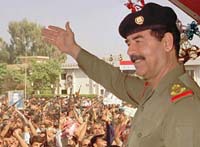Saddam Hussein Struck Out of History to Split Iraq Even More
Iraq’s Ministry for Education has decided to erase the memory of the former dictator of the nation Saddam Hussein. The scientific conference, which took place in Iraq last week, decided to not mention the name of the former Iraqi president Saddam Hussein in textbooks on history. It was also decided not to use such word combinations as the “US incursion” or the “US occupation.”

The head of the committee for educational programs of the ministry stated that new education programs were not supposed to become a reason for discord in the society.
As for the word combinations related to the US military presence, Iraqi education ministry officials most likely decided to please US Vice President Joe Biden, who was visiting Baghdad at the time when the conference was being held.
Russia Today: US military in Iraq needed “hardcore” troops with warlike mentality
The decision to strike Saddam Hussein’s name out of the history of Iraq may lead to unexpected results. The name of the Iraqi dictator may fall into the national mythology, which is a dangerous phenomenon. It is worthy of note that American tax payers will have to cover the costs connected with the production of new textbooks on the history of Iraq.
Not all Iraqis consider Saddam Hussein a bloody dictator. Even his execution received mixed reaction in the general public both inside and outside Iraq. Could the former Iraqi dictator hide for two years after the start of NATO’s incursion if he had no support of his people?
Saddam was charged with the genocide of the Kurdish people and Shiite Iraqis. He was sentenced to death and executed on December 30, 2006. His cousin and the former head of the Iraqi intelligence Barzan Ibrahim al-Tikriti and the former chairman of the Revolutionary Court of Iraq, Awad Hamed al-Bandar, were executed on January 15, 2007. His sons were killed in a special operation.
However, Saddam Hussein is still a martyr for many Sunni Iraqis. The guerrilla warfare has not stopped in Iraq. Sunni suicide bombers have killed thousands of people. NATO troops have suffered considerable losses too. Explosions continue to occur in many Iraqi cities. A series of terrorist acts took place in the country on Sunday, July 4th.
Barack Obama stated during his address to the nation on July 4th that the USA would complete its military operation in Iraq already this summer. According to Obama, the withdrawal of US troops from Iraq before August 31 was one of the top priorities for the US administration. Washington plans to withdraw nearly 45,000 military men from Iraq by the end of August 2010. About 95,000 US servicemen are currently staying in Iraq. The contingent is said to be cut to 50,000 by September.
It is too early to speak about the end of the US military presence in Iraq. The White House is aware of the weakness of the incumbent Iraqi regime. Iraqi Prime Minister Nouri Maliki and his rival, the former head of the government Ayad Allwi have been in dispute during the recent weeks about the formation of the next government of Iraq. Washington had to interfere. Joe Biden arrived in Baghdad to reconcile the feuding sides. He had meetings with Maliki, Allawi and President Jalal Talabani.
Maliki, the sitting Prime Minister, stated that he relied on the largest faction in the parliament, although his bloc lost two seats during the parliamentary vote in March. According to Maliki, the argument between the politicians is not supposed to cause any damage to the interests of the country and its people.
Former Prime Minister Allawi said that Vice President Biden had not submitted any certain suggestions on how to regulate the crisis. The official added that the new government in Iraq must be established as soon as possible not to let external forces use the political vacuum to aggravate the situation even further.
Biden’s attempts to find a solution to the political crisis have caused mixed reactions with Iraqi politicians. Some of them praised Biden’s efforts to reconcile the feuding parties. Others claimed that the US Vice President was trying to endorse the American solution for an internal political crisis in Iraq.
Therefore, the recommendations from the Iraqi ministry for education not to mention Saddam Hussein’s name in textbooks on history look quite hazardous against such a background. They may split the Iraqi society even more.
Even if the name of the Iraqi dictator no longer appears in textbooks, it will be preserved in world sources on history. Saddam is a part of world history and will always be.
Ivan Tulyakov
Pravda.Ru
Subscribe to Pravda.Ru Telegram channel, Facebook, RSS!




